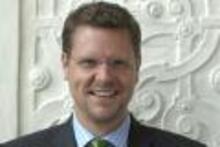
Thursday, February 28 at 4:00, LC 319. The Medieval & Renaissance Colloquium presents: Michael Witmore, Folger Shakespeare Library. Michael Witmore became Director of the Folger Shakespeare Library on July 1, 2011. He was formerly Professor of English at the University of Wisconsin-Madison, and he has served as Associate Professor of English and Assistant Professor of English at Carnegie Mellon University. The recipient of numerous fellowships, he has held an Andrew Mellon Postdoctoral Fellowship at the University of California, Los Angeles, a research fellowship and a curatorial residency fellowship at the Folger, and a predoctoral fellowship at the Max-Planck-Institut für Wissenschaftsgeschichte in Berlin. He was awarded (but declined) an ACLS Digital Innovation Fellowship for the academic year 2011-12. Dr. Witmore earned an A.B. in English at Vassar College, and an M.A. and Ph.D. in rhetoric at the University of California, Berkeley. Among his more recent projects, he launched the Working Group for Digital Inquiry at the University of Wisconsin-Madison and organized the Pittsburgh Consortium for Medieval and Renaissance Studies. His publications include numerous articles, website resources, and book chapters, and he has published five books: Landscapes of the Passing Strange: Reflections from Shakespeare, with Rosamond Purcell (2010), Shakespearean Metaphysics (2009), Pretty Creatures: Children and Fiction in the English Renaissance (2007), Childhood and Children’s Books in Early Modern Europe, 1550-1800 (2006), and Culture of Accidents: Unexpected Knowledges in Early Modern England (2001). In addition, he has given scores of presentations and been invited to serve on numerous academic panels. He was co-curator with photographer Rosamond Purcell of a fall 2012 exhibition at the Folger titled Very Like a Whale that explored the interplay between the real world and the world of the Renaissance imagination, and he continues to study the nature of digital inquiry in the humanities.